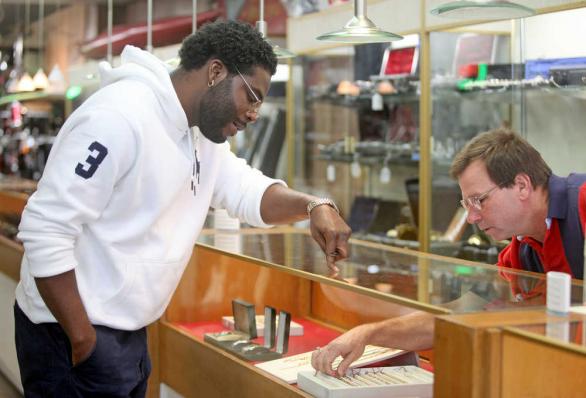
From THE AUGUSTA CHRONICLE
By Kelly Jasper
Staff Writer
Thursday, Feb. 16, 2012
Firsttime pawn customers are usually in for a shock.
In more ways than one, the experience defies expectations, said Ray Reynolds, the manager of United Loan & Firearms on Broad Street in Augusta.
“They see these shows on TV. You can call it a reality show if you want, but there’s not a lot of reality to it,” Reynolds said.
In reality, most pawn customers are looking for a safe place to borrow a little money to get by, he said. Most don’t take out more than they need, and the majority return to claim the goods they left as collateral.
“You have to tell people, ‘Don’t be scared of coming down.’ It’s a nice, friendly process,” he said. “It’s just something they’ve never had to do before.”
People who seek out pawn loans come from “all different walks of life,” said Matt Butler, the manager of Downtown Pawn on Broad Street in Augusta.
The National Pawnbrokers Association reports that the average pawn customer is 36 and makes about $29,000 a year. A third of pawn customers own homes, and 80 percent are employed and have their high school diploma or GED.
The average pawn loan is about $80.
Often, customers come in expecting an item’s appraised value.
“Chances are, you’re not going to get what the item is worth,” said Geoff Grant, an employee of Belair Jewelry and Pawn on South Belair Road. “For a $600 ring, we’ll pay you for the gold or silver weight of it. You’re looking at $75 to $100. A lot of people are taken back, but they understand.”
Pawnshops have to make money, even when borrowers default on a loan, Reynolds said.
“They don’t understand the wholesale vs. retail concept,” he said. “If you tell me you paid $500 for a gun, but I can buy it direct from the manufacturer for $250, there’s no way I can give you $500 for it. It’s business.”
Some pawnbrokers recommend shopping around for the best price, but others suggest that the loans and fees aren’t likely to vary.
Caps on interest rates are set by the state. In Georgia, pawnbrokers can charge up to 25 percent interest every 30 days for the first three months, and 12.5 percent every month after that.
In South Carolina, interest is charged along a sliding scale. Pawnbrokers charge anywhere from 25 percent on a $50 loan to 5 percent on a $1,000 to $2,000 loan. Pawnbrokers in South Carolina can’t give loans for more than $2,000.
Grant recommends not borrowing too much at once.
“The way to stay on top of pawn loans is to only borrow what you need,” he said.
Both Georgia and South Carolina offer a grace period for unpaid pawn loans. In Georgia, pawnbrokers offer a 10 day grace period on all transactions, except for vehicles, which receive 30 days. During the grace period, pawnbrokers can’t resell the item, even if the bower has failed to repay the loan. In South Carolina, the grace period is 60 days after the pawn is due.
Some stores offer more generous grace periods than the law requires.
United Loans and Firearms holds items for 90 days.“We try to give them the extra time in case there’s been a problem or they just forgot,” Reynolds said.
Stores also vary.
Belair Pawn specializes in antiques and has a variety of swords, furniture and old coins. United Loan specializes in gold, jewelry and guns.
At Downtown Pawn, customers pawn a variety of items, including tools, musical instruments, sports memorabilia and electronics. Tablets, like the iPad, are popular items to pawn right now.
Every now and then, heirlooms, such as wedding china, are pawned.
“We’ll look at pretty much any item,” Butler said. When it comes to electronics, though, “if the serial number is missing or altered, we absolutely won’t accept it.”
Most shops are careful not to deal in stolen goods.
“We give a report to police every single week to crossreference with their reports,” Butler said.
“They’re extremely detailed.”
Pawning in an ancient business, and many local stores have roots in the community. United Loan & Firearms has operated in Augusta since the 1940s.
“A lot of people look at pawn stores as a bad thing,” Grant said, “but we’re loaning money that the banks don’t loan. We make small loans, the ones that get you through to payday. Pawnbrokers are the original microfinance lenders.”
ADVICE FROM PAWN PROS
- BRING ID. You’ll need it to pawn items.
- ASK QUESTIONS. The pawnbroker behind the counter might have particular expertise in the item. “If we know anything about the item, we’ll do our best to educate them and pass on that knowledge,” said Matt Butler, the manager of Downtown Pawn on Broad Street in Augusta.
- EXPECT A PAWN TICKET that details what item you pawned, how much you have to repay, and how long you have to repay it. Ask for clarification if any of the terms aren’t clear.
- ASK ABOUT OPTIONS TO EXTEND LOANS if you’re not ready to repay. Most loans can be extended for 30 days at a time, with additional fees.
- EXPECT ABOUT 20 TO 25 PERCENT of an item’s value, said Geoff Grant, an employee of Belair Jewelry and Pawn. With items like gold or silver jewelry, it often doesn’t matter if the item is damaged. It can still be pawned or sold for the value of the gold.
- WEIGH THE COSTS AND BENEFITS. Pawn loans have substantial interest rates, but, unlike other loans, failing to pay the loan has no impact on your credit.